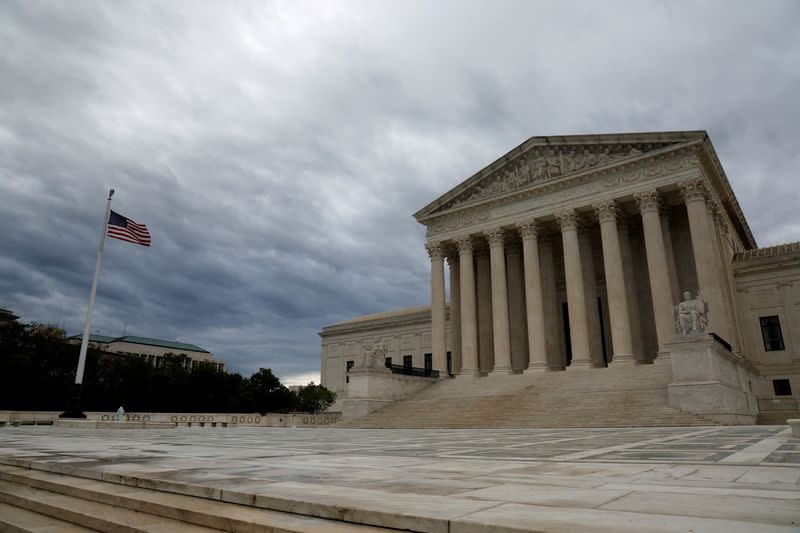US Supreme Court appears split over appeal by convicted border drug 'mule'

- Oops!Something went wrong.Please try again later.
By Andrew Chung and John Kruzel
WASHINGTON (Reuters) -The U.S. Supreme Court on Tuesday appeared divided over a California woman's bid to overturn her conviction for smuggling drugs across the U.S.-Mexican border in a legal dispute over her defense that she acted unwittingly as a "blind" drug mule.
The justices heard arguments in Delilah Guadalupe Diaz's appeal after a lower court refused to exclude testimony by an expert witness who cast doubt on her claim that she did not know that methamphetamine valued at $368,550 was hidden in the door panels of the car she was driving.
The case tests how far law enforcement agents testifying as expert witnesses can go in telling a jury that defendants in certain drug trafficking cases generally have a "guilty mind."
A jury in federal court in San Diego found Diaz guilty in 2021 of illegally importing the methamphetamine, a crime that required proving that she knew the drugs were in the car. Diaz was sentenced to seven years in prison.
A judge allowed an expert witness to testify in the trial that drivers usually know they are being hired to traffic drugs. While some justices appeared to lean toward the position of President Joe Biden's administration to allow such testimony, others appeared to favor reining it in.
Conservative Chief Justice John Roberts questioned Diaz's attorney Jeffrey Fisher's argument that the testimony violated a provision of the longstanding Federal Rules of Evidence governing the types of evidence allowable in legal cases.
The rule bars expert witnesses from opining on the "mental state" of defendants related to an alleged offense and whether they knew they were committing a crime.
Roberts said a defense lawyer could rebut the witness testimony during the trial.
"He could presumably stand up and ask the expert: 'Mr. Expert, are you saying that in every case, someone knows that the drugs are in the car?' Presumably, he would say, 'No,'" Roberts said. "'And are you stating an opinion about whether this individual knew she had drugs in the car? He would have to say, 'No,' right?'"
U.S. District Judge Anthony Battaglia during the trial let the prosecution's expert witness, a Homeland Security special agent, testify that "in most circumstances, the driver knows they are hired." The expert also told the jury that drug-trafficking organizations generally do not entrust large quantities of drugs to unknowing couriers.
People who smuggle drugs across borders, sometimes called "mules," may do so for profit but also sometimes do it unwittingly, transporting illegal substances that were planted on them. These individuals are often called "blind" mules.
Some of the justices challenged Justice Department lawyer Matthew Guarnieri's position that even if an expert opined that drug couriers always know there are drugs in the car it would not violate the evidence rule.
"So all defendants know of drugs - and it's still not testimony about the defendant's mental state?" conservative Justice Neil Gorsuch asked.
Liberal Justice Sonia Sotomayor suggested to Guarnieri that his interpretation of the rule would effectively allow experts to opine on a defendant's case by cloaking their testimony in broad, general language.
"You could just say, 'Anyone who has 55 pounds of drugs in their car - hidden or not - knows the drugs are there. Period," Sotomayor said. "To me that's a functional equivalent of saying, 'This defendant had 55 pounds of drugs, so she has to know.'"
In 2020, border inspectors ordered Diaz, a resident of Moreno Valley, California, to roll down a window of the Ford Focus vehicle she was driving and heard a "crunch-like" sound, later finding 56 packages containing more than 24 kilograms of pure methamphetamine. Diaz denied knowledge of the drugs.
She carried two cellphones - one locked that she could not open - and claimed that the car belonged to a boyfriend she had visited in Mexico whose phone number and residence she could not identify. The car also had a hidden GPS device.
The Supreme Court's ruling is expected by the end of June.
(Reporting by John Kruzel in Washington and Andrew Chung in New York; Editing by Will Dunham)

